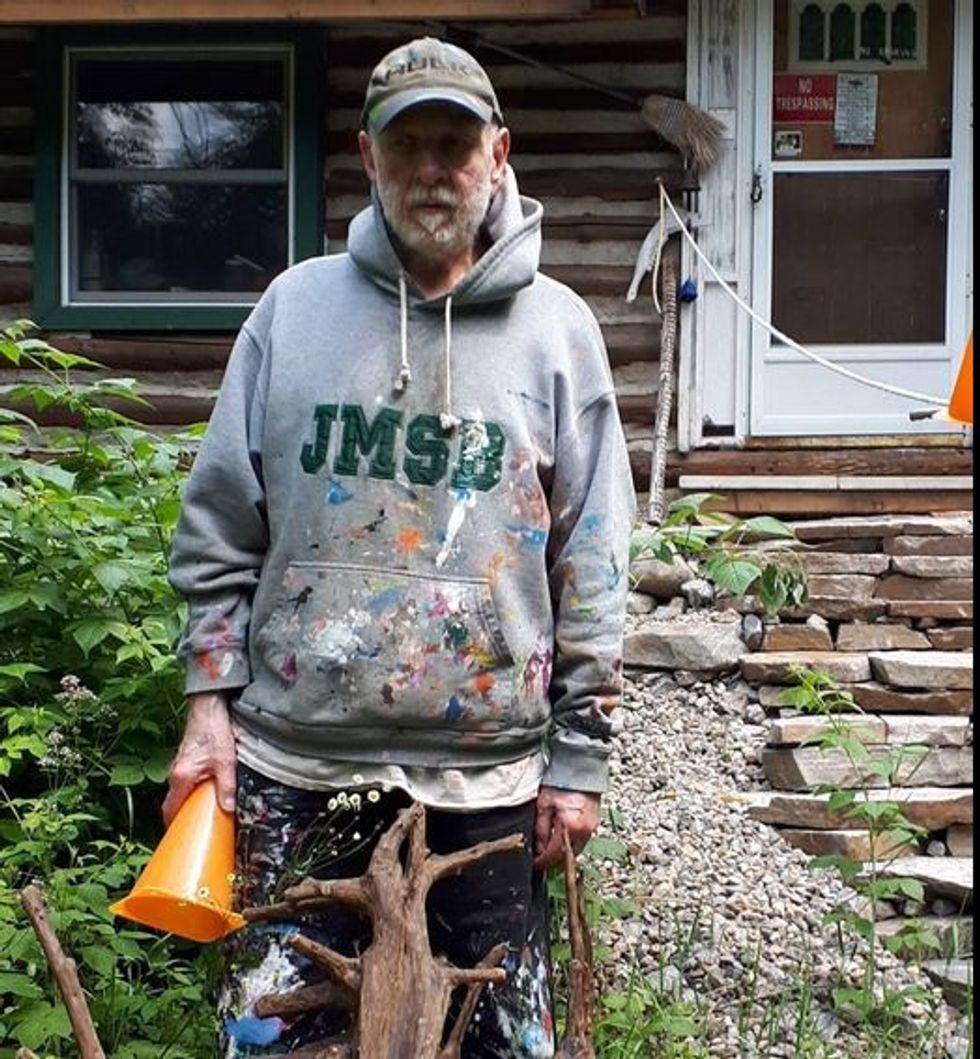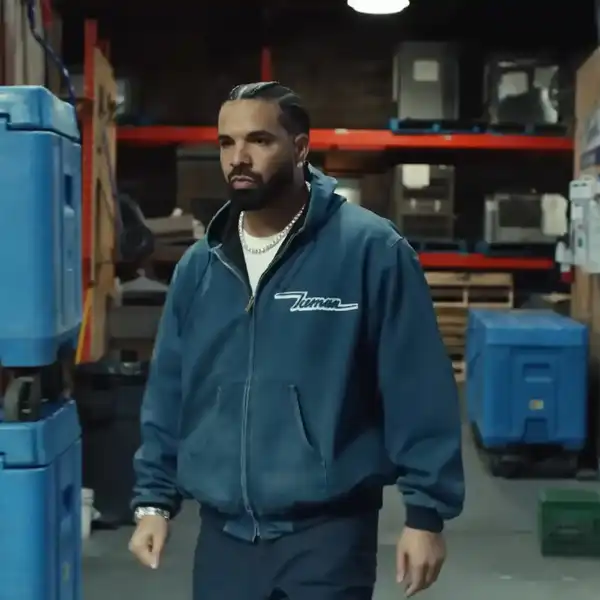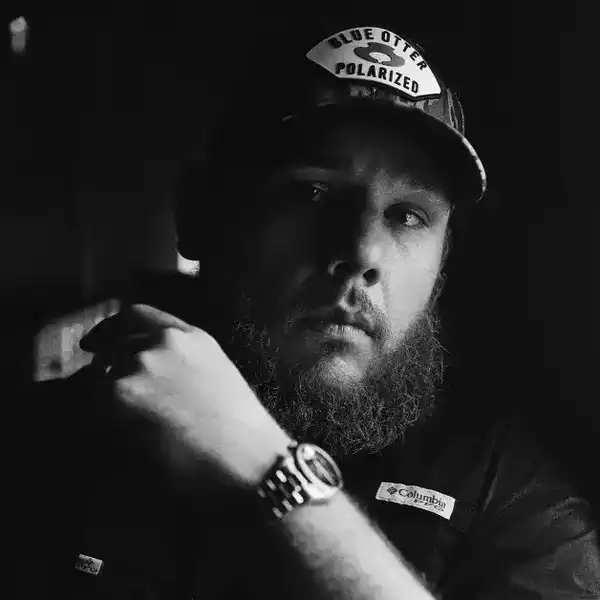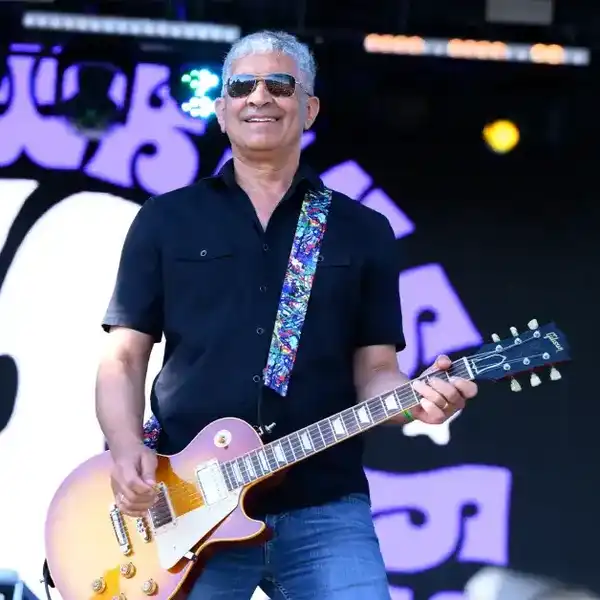Mendelson Joe: 2014 Interview From The Archives
Prickly, eccentric, obstinate, opinionated, intimidating, a pussycat and uniquely talented, the gravelly voice that fronted the McKenna Mendelson Mainline went on to create a micro-industry of

By Bill King
Prickly, eccentric, obstinate, opinionated, intimidating, a pussycat and uniquely talented, the gravelly voice that fronted the McKenna Mendelson Mainline went on to create a micro-industry of Mendelson Joe music and art. In the following interview, he shows a softer side rarely seen in public. The interview was first republished in King's Talk! Conversations In All Keys, Volume. 1.
I met Joe back in the days when he was “Mainline” Joe to all of us. He wasn’t the most approachable person in the room, but we'd talk—sideways out the side of our lips. We were both opinionated and posted ‘letters to the editor’ to any paper that would print. Most times we ranted about politics, social injustice, or the sordid music industry; the boys were pissed.
If memory is accurate, 1972 and Joe’s band Mainline had just recorded Live at the Victory and were having difficulty, or that’s what I was informed, mixing the tracks, so engineer Bill Seddon called me and gave me a shot. I lived and breathed those punchy Rolling Stones tracks, with drummer Charlie Watts pumping that raw beet. That was how I mixed it. Bill and I sat back, replayed, and thought we’d found a solution. We thought drummer Tony Nolasco had the same fire and intensity, but from what we heard, washed out and under-mixed. At least that’s how I saw it. A day later, Joe hears and informs me to keep my hands off his music. No love shared!
The years pass, and I publish a magazine—the Jazz Report —and freely write my editorials and keep up with Joe’s swing from paper to paper. I liked Joe’s rants. To me, he was spot on. When FYI’s David Farrell said, “What about Joe?” I thought—Joe and I are old fuckers - now so let’s talk.
Mendelson Joe: Good Day
Bill King: Is this Mendelson, Joe?
M.J: Speaking.
B.K: How are you doing?
M.J: Normal and you?
B.K: Joe, I wondered if we could pick a time to interview you about your art?
M.J: Do it right now. Just tape it. That way you get it right.
B.K: How have you been?
M.J: That’s a complicated question. Do you want the complex answer or the short answer?
B.K: I want the complex answer.
M.J: I’ll wait until you get your tape recorder working.
B.K: We’re good.
M.J: Under Harper, we have lost our way. We are at war, and he’s using the troops as part of his taxpayer-funded re-election campaign, allegedly to protect and serve women and children fleeing from ISIS. With Assad, he did nothing for women and children for years. He’s the biggest hypocrite ever breathed. He’s a dictator, and Canadians are the dumbest spoiled brats on planet Earth. How’d I do?
B.K: More.
M.J: Rarely do I meet anyone engaged enough to understand, and I’m not the smartest person. If we don’t share our views, which democracy allows us, and Harper has his way, then we will have a Pinochet in waiting.
B.K: Propaganda?
M.J: It never stops.
B.K: How’s the painting coming?
M.J: Learning how to do it at thirty-nine point nine years, and still doing it.
B.K: What motivated you to paint?
M.J: I found them in the garbage. I’m a resourceful guy. My sister didn't play the guitar, so I'm a musician. I’m a drummer. The painting thing; I just found them and tried it. The music industry makes me vomit. To cope with my rage at my experience in the music business, having been with about three thousand labels, painting serves me correctly because I don’t need any complex system to make a painting. When the painting is done, and if I do a good job, it doesn’t disappear - music is transient. Painting is concrete. You can stop and look at the thing. You can look at it every day and see it as the same picture. It’s very good for me.
B.K: How did you arrive at your style?
M.J: Well, you make it up the same as music. I’m a self-taught musician. You never stop learning if you are self-taught. If a system has taught you, then you are pretty well bound by the system that reduces creativity. When you are self-taught by anything, you are inevitably going to be original. That’s how it works.
B.K: What about those who replicate something that stuck in their head borrowed from those who came before and found themselves?
M.J: Well, O.K., I get it. So, Jerry Lee Lewis and Little Richard's piano playing affected me, and I can’t play piano well, but I play guitar like they played piano. So, I understand what you just said. With painting, I was an ignoramus. Now I’m learning about other artists’ works because I’m so skilled and developed at what I do. Now I know the difference between a Monet and a Manet. I recognise why some artists are great artists, and others are just emulators. As you develop your own thing and do it from the beginning, you inevitably realise all kinds of things. Technique. My technique is entirely my own because I had to figure it out. The key to all creativity is figuring it out.
B.K: How does your day arrive?
M.J: You mean, every day? It depends on obligations. I’m one of these people who don’t procrastinate, so if you’re asking me if I have a painting on the go - I’m just doing a portrait of Julian Fantino, the guy who represents and dumps on veterans. I’m painting him today because that’s my job today. When I finish that—then the next day I’ll start something else; whatever’s on my mind, and in this case, it’s not a pretty picture. Much of what I do is paint a lot of landscapes because beauty is the perfect antidote to evil - malevolence never ceases in human behaviour. I get up and have routines. I walk a mile and a half every morning. I go to the bathroom every morning. I have my coffee every morning. Some days are “Joe job” days when I go to town and buy stuff for my work. When you love what you do, it’s easy to do it.
B.K: Do you live by yourself?
M.J: I do.
B.K: In a remote area?
M.J: Relatively speaking. By city folks’ standards, they couldn’t relate to how I live.
B.K: Do you ever find isolation difficult, or are you comfortable?
M.J: I’m comfortable with myself. Are there neighbours I dislike—of course! The question is—how much does one interact with humans? There are some people in my neighbourhood, and my neighbourhood could be twenty-five miles away from them. Then I’ll see if I choose to socialize. You adapt. I’m not a people person. I’ve never been. People tolerate me, and I don’t socialize in groups unless I’m paid a fee.
B.K: Have you always been this way?
M.J: Since I was a kid. When people get together in groups, they get stupid. If they drink, they get foolish. I grew up with people who drank. I feel comfortable when I’m on stage performing because that’s my job.
B.K: What happens when a gallery takes on your art and has an opening?
M.J: I don’t show up anymore. I do it all by Skype. I’m like Margaret Atwood in that regard. The only reason I would go to any exhibition opening of my stuff would be if they paid me. The difference is—when I perform music, they pay me. When you visit an exhibition to meet and greet, it makes me puke. I don’t do book launches for my books. I don’t feel comfortable with small talk.
B.K: What’s a great Joe Day?
M.J: When you’re healthy and not locked in a prison.
B.K: How is your health?
M.J: Pretty good. I’ve been a diabetic two since 1990, but because I’ve learned how to eat correctly and exercise pretty much religiously, we are all going to die, it’s just a question of how I’m O.K. I don’t have any symptoms. Thanks for asking. Do you have children?
B.K: Yes, a son.
M.J: I remember, I wrote to him once. That’s the one thing I don’t have - the responsibility of caring for a child. I chose this life. You had a much bigger responsibility.
B.K: The child grows up, and they are your best friend. That’s the magic in that, and we’ve had remarkable years together.
M.J: That’s an unusual story. I can’t imagine being best friends with my father when he was alive.
B.K: Joe, my father and I didn’t become friends until he was in his seventies.
M.J: At least you became friends.
B.K: Joe, it took a lot of work. One must bend—step in and clear the air.
M.J: How did you do it?
B.K: I sent him a book a month that interested me. That way, I opened the world of me to him. We had to survive the Nixon and Reagan years. Americans are overly politicized.
M.J: You are brilliant then. I understand the difference – Reagan was a puppet whereas Nixon was a monster.
B.K: We were talking earlier about the situation for returning soldiers and underfunding and mishandling. I had to look at my dad’s generation and the fact many suffered post-traumatic stress disorder and never diagnosed, and this was something I had to take into consideration in our relationship.
M.J: I think you’ve been very kind to Canadians. I think you are wrong. Canadians have been assholes and first, what we did to the First Nations people is much the same as Americans. Murder them, steal their land, and destroy their children’s minds. I think we are all assholes and just a question of who learns from their mistakes. All I can say to you is I just learned something from you, and the answer is to send people books because they might read. That was a brilliant idea.
M.J: What was the first book you sent your father?
B.K: If I think right, probably Best American Short Travel Stories. Every season they would pick a great travel writer like Paul Theroux or Bill Bryson and instruct them to assemble a collection of the most intriguing writers and adventures of the past year. In doing so, the words popped off the pages, and the reader would travel around the planet. I figured the only way to wean him off “FOX News” for a few days was to send him around the world with his nose in a book and let him feel and imagine the lives of others. And it worked.
M.J: That’s a success story.
B.K: I primed him for change. What’s coming up?
M.J: The only thing coming up is death. I always live as if today is my last because I used to ride a motorcycle for thirty-five years. So, when you ride a motorcycle, you know today is your last day, and you think like that, and you are liable to live because you recognise how dangerous life is. If today is the last day I lived, then I went out with a good story about your relationship with your father.
B.K: That’s a good day!

















